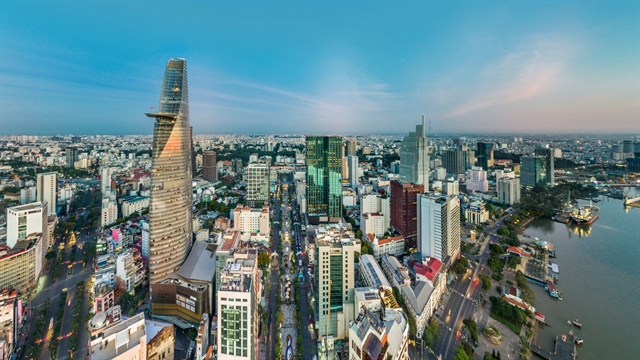 |
| View of Ho Chi Minh City skyline. The city has implemented tax exemption and tax reduction policies to further encourage startups under Resolution 98. — VNA/VNS Photo |
Ho Chi Minh City — The government has issued a Decree providing special policy mechanisms for corporate tax and personal income tax exemption in Ho Chi Minh City.
The move was made in response to Resolution 98, a resolution approved by the National Assembly on piloting special mechanisms and policies for the development of Ho Chi Minh City.
This Decree exempts companies engaged in innovative start-up activities, scientific and technological organizations, innovation centers and intermediary organizations supporting innovative start-ups from corporate tax on the income earned from these activities.
This exemption will last for five years, including income earned from innovative start-up activities.
Additionally, individuals and organizations with income from investments in startups are exempted from personal and corporate income taxes.
This tax incentive is aimed at increasing the city's attractiveness to foreign investors.
Individuals and start-ups must meet certain conditions and obtain certification to receive tax benefits.
These conditions include operating in priority sectors, engaging in innovative activities, and holding certifications for tax exemption consideration.
The country's largest economic center has great potential for economic growth and job creation thanks to its thriving startup ecosystem.
It is home to more than 2,000 startups, accounting for approximately 50% of all startups in Vietnam.
The city is currently drafting regulations and guidelines to support these start-up activities and ensure that the tax exemption policy is properly implemented.
Phan Van Mai, Chairman of the Municipal People's Committee, said tax incentives and attracting top talent will contribute to the growth and development of a thriving startup ecosystem, promoting economic growth and job creation. Ta.
Prime Minister Pham Minh Trinh acknowledged at last week's meeting that implementation of the resolution was flawed and called for stronger implementation of the resolution.
The resolution, which came into force in August last year, outlines several tax incentives for startups in Ho Chi Minh City.
It includes 44 mechanisms and policies addressing investment management, finance, budgeting, urban management, natural resources and environment, science and technology management.
Also introduced are transport-oriented urban development models, financial mechanisms to reduce greenhouse gas emissions, and the installation of solar power on the roofs of administrative offices and public service units.
This new resolution replaces the old resolution issued in 2017 on the pilot implementation of certain policies for the development of Ho Chi Minh City.
The new resolution authorizes the City People's Committee to determine and adjust fees and charges not included in the Fee Law, as well as to allocate the unallocated portion of the budget to the city's district People's Committees. be.
Additionally, Ho Chi Minh City is authorized to collect funds from businesses within industrial parks and export processing zones to maintain and rehabilitate their infrastructure.
It will also allow the piloting of financial mechanisms to reduce greenhouse gas emissions through the exchange, clearing and trading of carbon credits with domestic and international investors.
The city is also allowed to install solar power generation systems on the roofs of administrative offices and public service facilities.
Ho Chi Minh City plays a leading role in the country's economic situation, contributing significantly to the country's GDP, especially in the industrial sector, and strengthening the national budget.
Experts say the city's dynamic and pioneering spirit is driving reform and development, and the resolution aims to restore the city's leadership position, which it has lost in recent years. —VNS

